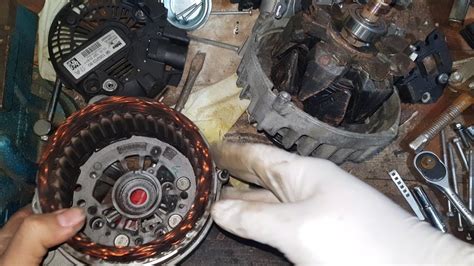Alternator Bearings: The Heartbeat of Your Vehicle's Powerhouse
Alternators are crucial components in a vehicle's electrical system, responsible for generating and regulating electrical power to charge the battery, power accessories, and ignite the engine. At the core of these alternators lies a small but mighty component—the alternator bearing.
Types of Alternator Bearings
There are primarily two types of alternator bearings:

-
Ball Bearings: Consist of steel balls rolling between races, offering a lower coefficient of friction and higher speed capability.
-
Roller Bearings: Utilize cylindrical rollers between races, providing greater load-carrying capacity and durability.
Importance of Alternator Bearings
Alternator bearings play a pivotal role in the overall functioning and longevity of the alternator:

-
Smooth Operation: Bearings enable smooth rotation of the alternator's rotor, ensuring efficient power generation.
-
Reduced Friction: Bearings minimize friction between moving parts, reducing wear and tear and prolonging the lifespan of the alternator.
-
Load Support: They bear the weight of the alternator's armature and rotor, ensuring proper alignment and preventing excessive vibrations.
-
Shock Absorption: Bearings absorb shock and vibrations generated by the alternator, protecting other components from damage.
Consequences of Worn Alternator Bearings
Neglecting alternator bearings can lead to severe consequences:

-
Premature Alternator Failure: Worn bearings increase friction and stress, leading to premature alternator failure.
-
Battery Discharge: A failing alternator cannot generate sufficient power, resulting in battery discharge and potential engine starting issues.
-
Electrical System Malfunctions: Faulty alternator bearings can cause voltage fluctuations, affecting the performance of electrical components.
-
Increased Fuel Consumption: A malfunctioning alternator increases the load on the engine, leading to reduced fuel efficiency.
Signs of Worn Alternator Bearings
Timely identification of worn alternator bearings is crucial to avoid costly repairs:
-
Squealing or Grinding Noises: Bearings produce a telltale squealing or grinding sound when worn, especially when the alternator is under load.
-
Dimming Lights: Fluctuating voltage caused by faulty bearings can lead to intermittent dimming of headlights and interior lights.
-
Battery Discharge: A weak or dead battery despite regular charging can indicate alternator bearing issues.
-
Burning Smell: Overheated bearings can emit a burning smell.
Maintenance and Replacement
Regular maintenance and timely replacement of alternator bearings are essential for optimal performance and longevity:
-
Inspect Regularly: Inspect alternator bearings periodically for signs of wear or damage.
-
Clean and Lubricate: Clean and lubricate bearings according to the manufacturer's recommendations to reduce friction and extend their lifespan.
-
Replace as Needed: Replace worn or damaged alternator bearings promptly to prevent further damage and costly repairs.
Effective Strategies for Prolonging Alternator Bearing Life
-
Proper Belt Tension: Ensure the alternator belt is properly tensioned to minimize excessive loads on the bearings.
-
Regular Voltage Checks: Monitor the alternator's voltage output to ensure it is within the specified range.
-
Avoid Overloading: Prevent overloading the alternator by limiting the use of high-power accessories.
-
Cleanliness: Keep the alternator clean to prevent dirt and debris from entering the bearings.
Benefits of Maintaining Alternator Bearings
Maintaining alternator bearings offers numerous benefits:
-
Extended Alternator Lifespan: Proper bearing maintenance significantly extends the寿命 of the alternator, saving on costly replacements.
-
Improved Electrical Performance: Healthy alternator bearings ensure stable voltage supply, enhancing the performance of electrical components.
-
Reduced Repair Costs: Timely bearing replacement prevents more severe alternator failures and associated repair costs.
-
Reliable Vehicle Operation: A well-maintained alternator bearing contributes to reliable vehicle operation, reducing the risk of breakdowns.

Comparison of Alternator Bearing Types
| Type |
Advantages |
Disadvantages |
| Ball Bearings |
Lower friction, higher speed |
Lower load-carrying capacity, more susceptible to contamination |
| Roller Bearings |
Higher load-carrying capacity, greater durability |
Higher friction, lower speed |
Case Studies
- The National Highway Traffic Safety Administration (NHTSA) estimates that over 10% of vehicle breakdowns are caused by alternator failures, many of which are attributed to bearing issues.
- A study by the Society of Automotive Engineers (SAE) found that proper alternator bearing maintenance can increase the lifespan of alternators by an average of 25%.
- A survey conducted by the American Automobile Association (AAA) revealed that alternator bearing replacement is one of the most common roadside assistance calls, particularly during extreme temperatures.
Conclusion
Alternator bearings are indispensable components that ensure the efficient operation and longevity of your vehicle's alternator. By understanding their importance, recognizing the signs of wear, and employing effective maintenance strategies, you can prolong the life of your alternator, prevent costly repairs, and enjoy reliable vehicle performance.
Additional Tips:
- Use high-quality bearings from reputable manufacturers.
- Refer to the vehicle's owner's manual for specific bearing replacement instructions.
- Seek professional assistance if you encounter any difficulties while servicing alternator bearings.
